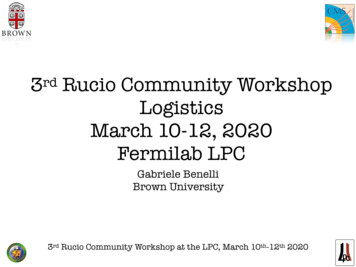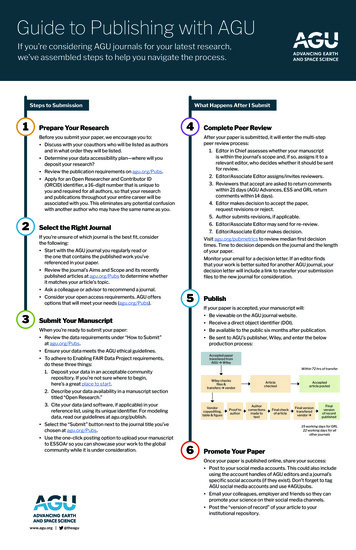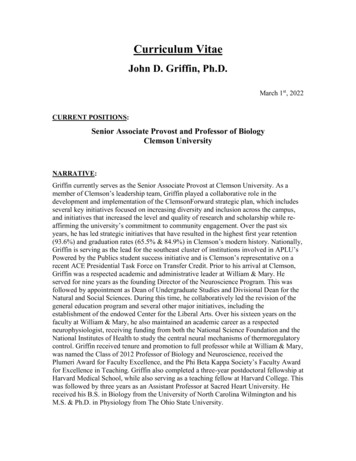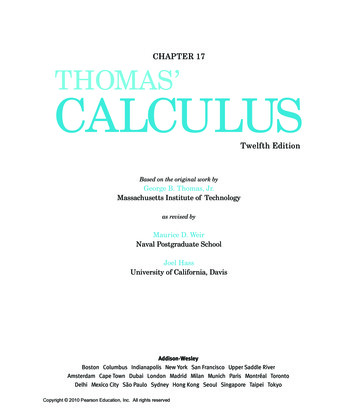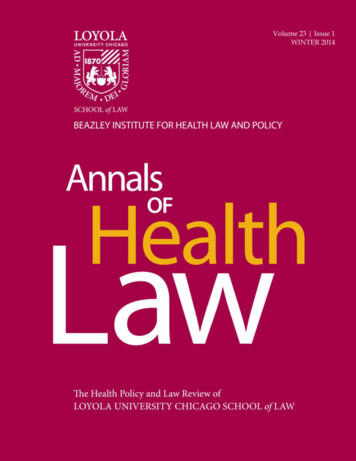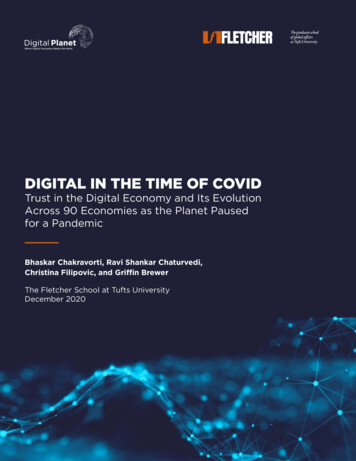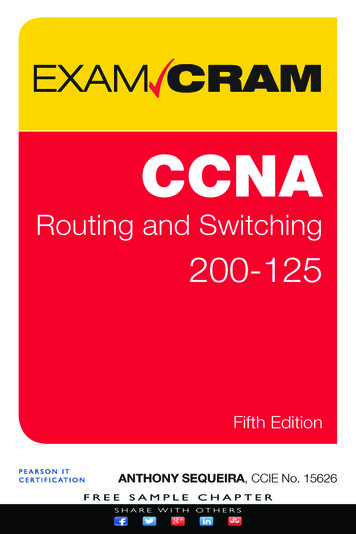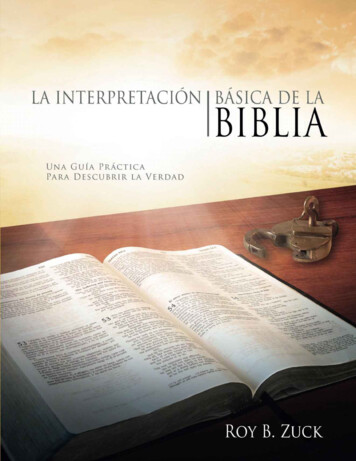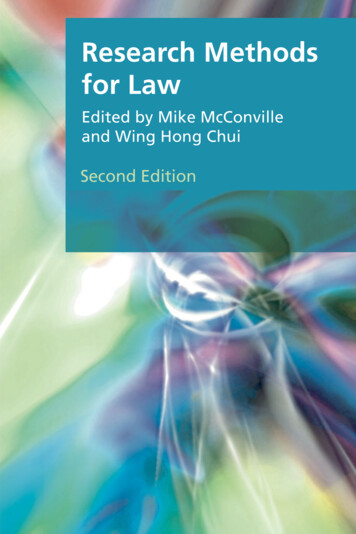
Transcription
Research Methodsfor LawEdited by Mike McConvilleand Wing Hong ChuiSecond Edition
Research Methods for LawSecond EditionEdited by Mike McConville and Wing Hong Chui
Edinburgh University Press is one of the leading university presses in the UK. We publish academicbooks and journals in our selected subject areas across the humanities and social sciences, combiningcutting-edge scholarship with high editorial and production values to produce academic works of lastingimportance. For more information visit our website: edinburghuniversitypress.com editorial matter and organisation Mike McConville and Wing Hong Chui 2007, 2017 the chapters their several authors 2007, 2017Edinburgh University Press LtdThe Tun – Holyrood Road12 (2f) Jackson’s EntryEdinburgh EH8 8PJFirst edition published in 2007Typeset in 11/13 Ehrhardt byServis Filmsetting Ltd, Stockport, Cheshire,and printed and bound in Great Britain byCPI Group (UK) Ltd, Croydon CR0 4YYA CIP record for this book is available from the British LibraryISBN 978 1 4744 0321 4 (paperback)ISBN 978 1 4744 0425 9 (webready PDF)ISBN 978 1 4744 0322 1 (epub)The right of the contributors to be identified as authors of this work has been asserted in accordancewith the Copyright, Designs and Patents Act 1988 and the Copyright and Related Rights Regulations2003 (SI No. 2498).
ContentsList of Figures and TablesPreface and Acknowledgements to Second EditionPreface and Acknowledgements to First EditionIntroduction and OverviewMike McConville and Wing Hong Chuiviiviiix11. Legal Research as Qualitative ResearchIan Dobinson and Francis Johns182. Quantitative Legal ResearchWing Hong Chui483. Doing Ethnographic Research: Lessons from a Case StudySatnam Choongh724. Interdisciplinarity in Legal ResearchPaul Roberts905. Integrating Theory and Method in the Comparative ContextualAnalysis of Trial ProcessMark Findlay and Ralph Henham6. Comparative Legal ScholarshipGeoffrey Wilson7. Research Ethics and Integrity in Socio-legal Studies and LegalResearchMark Israel134163180
vi research me t ho ds f o r l a w8. Researching the Landless Movement in BrazilGeorge Meszaros9. Rejecting the Dominance of Empirical Legal Scholarship –A Better Way of Choosing, Researching and Writing a ScholarlyArticleMichael Pendleton20523110. Researching International LawStephen Hall25311. Development of Empirical Techniques and TheoryMike McConville280Notes on ContributorsIndex303308
Tables and FiguresTA B LES2.12.22.32.42.52.65.1Core features of qualitative and quantitative methodsA summary of common non-probability samplingFive major methods of quantitative researchContinuum of quantitative research designsAdvantages and disadvantages of survey methodsMeasures of central tendency/Basic descriptive statisticsInstrumental factors in judicial discretionary behaviour515860616364153F IG U RESStages of planning and executing a studyUse of theories in quantitative researchThe Eternal Triangle of Intellectual InquiryConceptualising the structuration of trial processModelling the relationship between structuration and sentencingdecisions5.3 Inductive and deductive parallels2.12.24.15.15.25456100136139143
Preface and Acknowledgements toSecond EditionThe Second Edition of this book seeks to provide law students at all levelswith exposure to available methods of research – legalistic, empirical,comparative and theoretical – in an accessible, grounded but demandingand hopefully inspirational way, thereby enabling them to pursue researchfrom a variety of perspectives, as they will be expected to engage in duringtheir studies. It offers a pluralistic view of methodological issues and researchtechniques embracing empirical legal research, international and comparativelegal research, as well as doctrinal research. In so doing, a variety of researchmethodologies adapted from law and social sciences are introduced to investigate legal phenomena such as doing research in the field, criminal justice,international law and intellectual property law. The book has been revisedand enlarged with new chapters on interdisciplinarity in legal research andresearch ethics.The primary aim of the book remains to provide an introduction to someof the essential methodologies, approaches and tools of research in relation todifferent fields of law. Each chapter introduces generic research skills by examining qualitative or quantitative methodologies relevant to all areas of legalresearch or through engagement with a variety of areas such as internationallaw, intellectual property, public law, comparative law and criminal justicewhich are used to illuminate the application of particular skills. Throughout,attention is paid not only to technical issues but to the responsibilities of theresearcher and the moral dimension of research.We wish to thank all the contributors for their willingness to play a part inputting together this book, and of course, for their excellent work in preparing the chapters. We are indebted to Chuo University for kind permissionto reproduce the chapter by Geoffrey Wilson (sadly deceased in 2016). We
preface a nd a c kno wle d g e me nt s t o s e c o n d e d it i o n ixare also grateful to Sonia McConville for her help in preparing the script forpublication.We have been very fortunate to have had the support and guidance of JohnWatson, Ellie Bush and Eddie Clark of Edinburgh University Press, for theircommitment to the project and unfailing help at all stages of commissioningand production, and to our copy-editor Anna Stevenson for her attention todetail and tolerance.We end with our very best wishes to all those who set out to increase understanding of all aspects of social organisation through the demanding route ofsystematic inquiry.Mike McConville and Wing Hong Chui
Preface and Acknowledgements toFirst EditionLegal research may be carried out for varied reasons. Some use it to identifythe sources of law applicable to understanding a legal problem, and thenfind a solution to the problem that has been identified. It is apparent that practising lawyers are expected to conduct factual and legal research in an effectivemanner because of the cost implications for their client. Others would useresearch as a tool to extend our knowledge of aspects of law and the operationof the legal system that are of great interest. Research may also be driven bythe policy considerations promoted by bodies such as law reform commissions to investigate social, political and economic implications of current andproposed legislation. Increasingly, students are required to engage in researchthemselves and no longer have their studies confined to textbooks.No one denies that research in the real world is of increasing importance andthat conducting legal research is a complex business. Nevertheless, how far arelaw students, graduates, the legal profession and academic lawyers equipped toundertake legal research? How are their research skills comparable to those ofresearchers with a medical science, social science or humanities background?What pitfalls await the new researcher, and can these be avoided or addressedthrough careful planning? These are indeed very difficult questions, and it isnot the intention of this edited volume to look for a complete answer. Rather,it offers general and practical guidance to those who are interested in learninghow to use legal research in order to expand knowledge of legal processes,improve their understanding of specific legal problems and produce findingsof significance for society, and it sets out questions that a serious researcherneeds to ask before embarking upon any important project.The primary aim of the book is, then, to introduce some of the essentialmethodologies, approaches and tools of research in relation to different fields
preface a nd a c kno wle d g e me nt s t o f i r s t e d i t i o n xiof law. Each chapter introduces generic research skills by examining qualitative or quantitative methodologies relevant to all areas of legal research orthrough engagement with a variety of areas such as international law, intellectual property, public law, comparative law and criminal justice which areused to illuminate the application of particular skills. It is hoped that this willbe a cutting-edge volume advancing our knowledge of three specific kinds oflegal research, including black-letter legal research, empirical research, andinternational and comparative legal research.Given the complexities of each of these research methodologies, it is impossible to cover all approaches or methods of research within one text. However,we make it clear in our introductory chapter why some approaches will beelaborated in subsequent chapters, while others will be introduced brieflyand readers directed to further reading. The book has been designed to reacha wide audience, including black-letter lawyers, socio-legal researchers andthose in related disciplines such as sociology, political science and psychology.Last but not least, we wish to thank all the contributors for their willingnessto play a part in putting together this book and, of course, for their excellentwork. We are indebted to Chuo University for kind permission to reproducethe chapter by Geoffrey Wilson. We are also grateful to Eastman Chan at theChinese University of Hong Kong for her patience in preparing the script forpublication; to Alice Chan Ka-yee of the Chinese University of Hong Kongfor her technical help and support; the Series Editor of Research Methods forthe Arts and Humanities, Gabriele Griffin, for her constructive comments andsupport in the book project; and to Jackie Jones of Edinburgh University Pressfor her commitment to the project.Mike McConville and Wing Hong Chui
Introduction and OverviewMike McConville and Wing Hong ChuiLegal scholarship has historically followed two broad traditions. The first,commonly called ‘black-letter law’, focuses heavily if not exclusivelyupon the law itself as an internal self-sustaining set of principles which canbe accessed through reading court judgments and statutes with little or noreference to the world outside of the law. Deriving principles and values fromdecided cases and re-assembling decided cases into a coherent framework inthe search for order, rationality and theoretical cohesion has been the fodderof traditional legal scholarship.A second legal tradition which emerged in the late 1960s is referred to as‘law in context’. In this approach, the starting point is not law but problemsin society which are likely to be generalised or generalisable. Here, law itselfbecomes problematic both in the sense that it may be a contributor to or thecause of the social problem and in the sense that whilst law may provide asolution or part of a solution, other non-law solutions, including political andsocial re-arrangement, are not precluded and may indeed be preferred. Thelaw-in-context approach has given an extra dimension to legal studies that hasbeen taken up in every higher education institution.Apart from these broad traditions, however, legal scholarship has alsoundergone significant transformations and is facing significant challenges. Oneis the increasingly global character of legal life. This is seen in the ready accessthat can now be secured to materials describing and analysing legal systemsacross the world (previously inaccessible to most researchers) and requiring,at the least, that research and scholarship pay attention to alternative perspectives and consider their relevance to the local situation. Additionally, it isnow inescapable that trans-jurisdictional instruments, such as Conventionsrelating to human rights, increasingly penetrate domestic legal systems and
2 research me tho ds f o r l a wstimulate those responsible for operating or interrogating national systemsto have regard to wider considerations than was possible when the world wasconsiderably larger and less easily navigated.Additionally, the teaching of law has moved decisively away from ateaching-focused system of rote learning tested through examinations toa learning environment in which students are encouraged to assume moreresponsibility for their own education and in which research tested throughcoursework assignments plays a more prominent role. Law students are nowmore research-based than ever before, and research is an integral part of theundergraduate curriculum, no longer the preserve of postgraduate students.This means, at the least, that legal research and scholarship is much morepervasive, complex and demanding than ever before and those engaging inresearch have more possible pathways to travel and require a greater range ofskills and competences than their law-focused predecessors.A I MS OF THE B OOKEvery law school offers instruction on legal research to equip students withskills of identifying the sources of law and relevant legal materials, andadvanced methodology courses to support not only postgraduate students butalso those writing dissertations in later undergraduate years. Undeniably legalresearch is a complex business, and it ‘is not merely a search for information;it is primarily a struggle of understanding’.1 Both academic and practisinglawyers are required to think deeply about information recovered and discovered and what are the best methods of collecting, analysing, and presentinginformation and data. In many respects, strong legal research and writing skillsare fundamental tools for legal practice and scholarship. Based on his experience as a lawyer and research student, Nicholas Hancox draws attention to thedistinctive differences in terms of their perceived use of law and legal researchbetween academics and practising lawyers. Some of the observations are: ‘academic lawyers want to understand the way that law works and how it affectspeople and organisations, but practitioners are not interested in why the lawsays what it says’; ‘only academic lawyers are interested in how things are doneabroad’; ‘academics are often less interested in what they (alone) call blackletter law’; and ‘for academic lawyers, getting published is very important, butpractitioners ought never to have time to write books’.2 While acknowledgingthese as his subjective observations, the divide is somehow inevitable becauseof the different expectations among the two sets of lawyers. It is apparent thatscholarly legal research is comprehensive and directed towards conclusionswhereas practising lawyers are accountable to their clients who seek theirprofessional advice and knowledge on legal rules, authorities and procedures.
i ntr o d u c t i o n a n d o v e r v ie w 3Thus, the way academic and practising lawyers see the meaning of law andlegal research is diverse. Nonetheless, in order to advance legal scholarship, students, lawyers and academics are recommended to be open-mindedand flexible in terms of choosing the best method of u nderstanding and3 investigating a matter of concern.This edited volume seeks to provide law students at all levels with exposure to available methods of research – legalistic, empirical, comparativeand theoretical – in an accessible, grounded but demanding and hopefullyinspirational way, thereby enabling them to pursue research from a variety of perspectives, as they will be expected to engage in during their studies. It offersa pluralistic view of methodological issues and research techniques as opposedto adopting a narrow parameter of traditional legal research. More specifically,three major types of legal research, namely empirical legal research, international and comparative legal research, and doctrinal research, will be examinedin the collection. In so doing, a variety of research methodologies adaptedfrom law and social sciences will be introduced to investigate legal phenomenasuch as doing research in the field, criminal justice, international law and intellectual property law.4At the outset it should be acknowledged that this collection by no meanscovers all existing legal methodologies but contains selected examples ofresearch based upon the contributor’s research experience.5 It puts greatemphasis on the reasons for the choice of research methods, the importance ofpractical research experience and an examination of dilemmas and problemsencountered during the research process. One consistent theme highlighted ineach chapter is that while there are procedures or steps to be followed whenembarking upon a research project, the researcher is reminded of the need tobe reflective and reflexive during the research process and to question whetherthe chosen methodology is the most appropriate for researching the chosentopic.6T Y PES OF LE G AL RESEARCHDoctrinal researchA number of titles on legal research are available and have been adopted astextbooks for legal research courses across the world.7 Admittedly most ofthese texts on research methods for law are targeted exclusively at ‘blackletter law’ rather than non-traditional, interdisciplinary research projects.These texts are able to equip students with basic research skills including theknowledge of the sources of legal authority, locating cases and statutes, the useof indexes and citators, and the use of computer information retrieval systems
4 research me tho ds f o r l a wsuch as Westlaw and LexisNexis. In a word, the ‘black-letter law’ approach ordoctrinal research relies extensively on using court judgments and statutes toexplain law:Most [law departments/schools] have their own specialized librariesfull of raw materials for textual analysis: the law texts, case law,legislation, and, increasingly, materials via the internet. There isno need to go outside and research the material realities of people’severyday lives.8‘Black-letter’ research aims to systematise, rectify and clarify the law on anyparticular topic by a distinctive mode of analysis of authoritative texts thatconsist of primary and secondary sources. One of its assumptions is that ‘thecharacter of legal scholarship is derived from law itself’.9 David Stott articulates a range of skills of legal research to be covered and taught in the LegalPractice Course in the United Kingdom. They are as follows: to determine the objectives of the lawyer or clientto identify and analyse factual materialto identify the legal context in which factual issues ariseto identify sources for investigating relevant factsto determine when further facts are requiredto identify and analyse legal issuesto apply relevant legal provisions to factsto relate the central legal and factual issues to each otherto identify the legal, factual and other issues presented by documentsto analyse a client’s instructions and be able to identify legal, factual andother issues presented to them to present the results of research in a clear, useful and reliable form.10The above list is not exhaustive but summarises the skills component of themethods’ classes mainly for first-year undergraduate students. It is generallyagreed that these skills of conducting library legal research and computer legalresearch must be imparted to law students and new lawyers. Teaching legalresearch is not always an easy task, especially from the law librarian’s perspective, and training should not solely focus on finding information but shouldpromote students’ understanding of legal doctrine.11 In many respects, as faras law students are concerned, it remains the case that the majority of undergraduate and LLM-level dissertations are ‘black-letter’ and use interpretativetools or legal reasoning to evaluate legal rules and suggest recommendationsfor further development of the law.12
i ntr o d u c t i o n a n d o v e r v ie w 5Empirical legal scholarship/socio-legal studiesIn recent years, several commentators have criticised pure doctrinal analysisfor its ‘intellectually rigid, inflexible and inward-looking’ approach of understanding law and the operation of the legal system.13 There is evidence thatlaw schools in the United Kingdom, the United States and elsewhere areoffering new postgraduate programmes (such as socio-legal studies, feministlegal studies, critical legal studies and new approaches to international law)that encourage an interdisciplinary approach to the study of law.14 A numberof legal educators have drawn attention to the emergence of empirical legalresearch as well as socio-legal research:British university law schools are undergoing a radical change in thenature of legal research and scholarship. They were once dominatedby pure doctrinal analysis but new generations of legal scholars areeither abandoning doctrinal work or infusing it with techniques andapproaches drawn from the humanities and the social sciences . . .[T]his change will lead to a greater ability to provide law students witha truly liberal education and will also enable the law school to take amuch greater part in the intellectual debates to be found elsewhere inthe university.15The non-doctrinal approaches represent a comparatively new avenue of studying law in the broader social and political context with the use of a range ofother methods taken from disciplines in the social sciences and humanities.Socio-legal scholars point to the limitations of doctrinal research as beingtoo narrow in its scope and application of understanding law by referenceprimarily to case law. This traditional legal method fails to prepare studentsand legal professionals to attend to non-doctrinal questions.16 Roger Cotterrellcomments:All the centuries of purely doctrinal writing on law have produced lessvaluable knowledge about what law is, as a social phenomenon, andwhat it does than the relatively few decades of work in sophisticatedmodern empirical socio-legal studies . . .17The merits and relevance of using other disciplines such as sociology, politicalscience, economics, psychology, history and feminism as aids to legal researchhave been widely recognised. Interdisciplinary or socio-legal research broadens legal discourse in terms of its theoretical and conceptual framework whichguides the direction of the studies, and its specific research methodologies areable to generate empirical evidence to answer research questions. In the 1960s
6 research me tho ds f o r l a wand 1970s, legal realists and socio-legal scholars started the law and societymovement, and pointed to the importance of understanding the gap between‘law in books’ and ‘law in action’, and the operation of law in society. Theywere interested in examining the legal system in terms of whether legal reformbrings about beneficial social effects and protects the interests of the public.18Similarly, in the 1980s, critical legal studies integrated ideas and methodsfound in disciplines such as sociology, anthropology and literary theory.19 Onthe whole, these approaches to legal scholarship not only provided an alternative to the traditional legal analysis but also encouraged lawyers to engage incritical and cutting-edge research to examine the relationship between law andgender, social class, ethnicity, religion and other social relations of power.20At a more practical level, interdisciplinary legal research offers considerablepromise:In purely pragmatic terms, interdisciplinarity offers an opportunityfor product differentiation in an increasingly competitive academicenvironment: an ‘interdisciplinary perspective’ may help a researcherplace his or her work with a more prestigious academic journal orpublishing house. Interdisciplinary research is perceived to be popularwith research funding bodies, and for legal academics in particular itprovides access to research grants of a magnitude not usually availablefor ‘pure’ legal research.21What is more, socio-legal scholarship employs a wide range of applied socialscience methods including quantitative and qualitative research.22 Thesemethods aim to decipher the workings of legal, social and cultural processes.For instance, Dave Cowan and his colleagues employ a socio-legal analysis tostudy the role of adjudication or decision-making processes within the localauthority in influencing the implementation of homelessness law.23 Groundedin both quantitative and qualitative data, his research team confirms thatdespite the implementation of the homelessness law provisions in the HousingAct 1996 local authorities have chosen to exercise discretion in making decisions during the internal review, and obstacles were posed to most aggrievedapplicants for reviewing the decisions. Their study demonstrates how harddata were collected to examine how one legal institution operated and whetherlegal reform achieved its intended outcomes, thereby pointing to furtherpolicy and legal reform. It is important to note that empirical legal scholarshipis complementary to doctrinal research and both methodologies can be usedsimultaneously to examine a legal issue, as advocated by academic lawyers.24Nonetheless, doubts have been cast on whether the present-day law schoolsput enough emphasis on the social policy of law and provide students withsufficient training on the application of applied social sciences to legal research.
i ntr o d u c t i o n a n d o v e r v ie w 7To fill this gap, this book demonstrates that empirical research can transformhow law can be understood and studied.International and comparative legal researchThe third type of legal research covered in the book is international and comparative legal research. The reason for its inclusion is mainly because of theincreasing influence of international and supra-national legal materials, andthe increasing need for legal scholars to refer to materials from a variety ofjurisdictions, together with the demands made by contemporary law schoolsupon their students to engage in critical thinking. This type of research crossestraditional categories of law, integrating public and private international lawwith domestic law, European law and the comparative method. It aims tofacilitate our understanding of the operation of international law and legalsystems and its impact on the formulation of public policy in an era of globalinterdependence.STR UCT U RE OF THE B OOKThe book comprises eleven chapters. Together these chapters cover the mostcommon research methods within law, and use actual research projects asillustrative examples to discuss innovative ideas for conducting legal research.The limitations of each methodology are also highlighted. The pervasive butoften neglected issue of research ethics is seen in all chapters but is specificallyaddressed in Chapter 7. A selected bibliography of relevant research literatureis provided as further reading throughout the book.Chapters 1 to 4 provide an overview of qualitative and quantitative researchmethods which lay a foundation for fieldwork in the legal arena. In Chapter1, Ian Dobinson and Francis Johns define qualitative legal research as simplynon-numerical and contrast it as such with quantitative (numerical) research.Four broad divisions are identified: doctrinal, problem, policy and law reform.Regardless of which division, or combination of divisions, the research donefalls into, various qualitative approaches should be taken. The researcher’s aimshould be to reach certain conclusions (or inferences) based on what is found.In this sense, legal research is no different from other forms of academic orscholarly research and rigorous empirical methods should be used. Using suchempirical methods, however, requires a level of academic thoroughness andit is here, according to others, that much of the legal research which has beenundertaken falls short. This chapter seeks to alert the would-be legal researcherto such issues and, consequentially, by reference to research examples, how bestto undertake qualitative legal research in a more robust and structured manner.
8 research me tho ds f o r l a wThe principal task of Chapter 2 is to examine the nature and applications ofquantitative research methods in socio-legal studies. Wing Hong Chui beginswith an overview of the aims and core features of quantitative methods, whilstcontrasting these with qualitative methods. The role of theory in quantitative research is examined. A range of research designs such as measurementsof concepts and sampling strategies available for empirical research are alsodescribed. Illustrated with examples from classic and contemporary quantitative studies, the chapter then focuses on main data collection techniques suchas surveys, experiments and secondary data analysis. Particular emphasisis placed on unpacking the rationales, strengths and weaknesses of eachtechnique. This chapter ends with a discussion of quantitative data analysisand a review of ethical issues (discussed in greater detail in Chapter 7) in quantitative research.Chapter 3 identifies the key characteristics of ethnographic research, andexplains how Masters and PhD students can make an invaluable contribution to maintaining this socio-legal tradition. Valuable insights are providedinto the role of theory in qualitative research, the difficulties of formulatingresearch questions, and the multifaceted nature of gaining and maintainingaccess. Satnam Choongh uses his own experience of conducting research forhis DPhil thesis into procedural fairness at police stations to give practicalguidance on how and where to interview, how to structure interviews so as toextract the experiences and views of those being studied, and how to observe,record and analyse everyday interaction and occurrences in a manner whichprovides legal and sociological insight.In Chapter 4 Paul Roberts explores the meaning and value of interdisciplinarity in legal research. It begins with definitional questions concerningthe boundaries and constitution of law as a discipline, then opens out into amore general discussion of the criteria of methodologically sound research. Ageneric reasoning protocol – the Eternal Tria
Tables and Figures ta Bles 2.1 Core features of qualitative and quantitative methods 51 2.2 A summary of common non-probability sampling 58 2.3 Five major methods of quantitative research 60 2.4 Continuum of quantitative research designs 61 2.5 Advantages and disadvantages of survey methods 63 2.6 Measures of central tendency/Basic descriptive statistics 64
